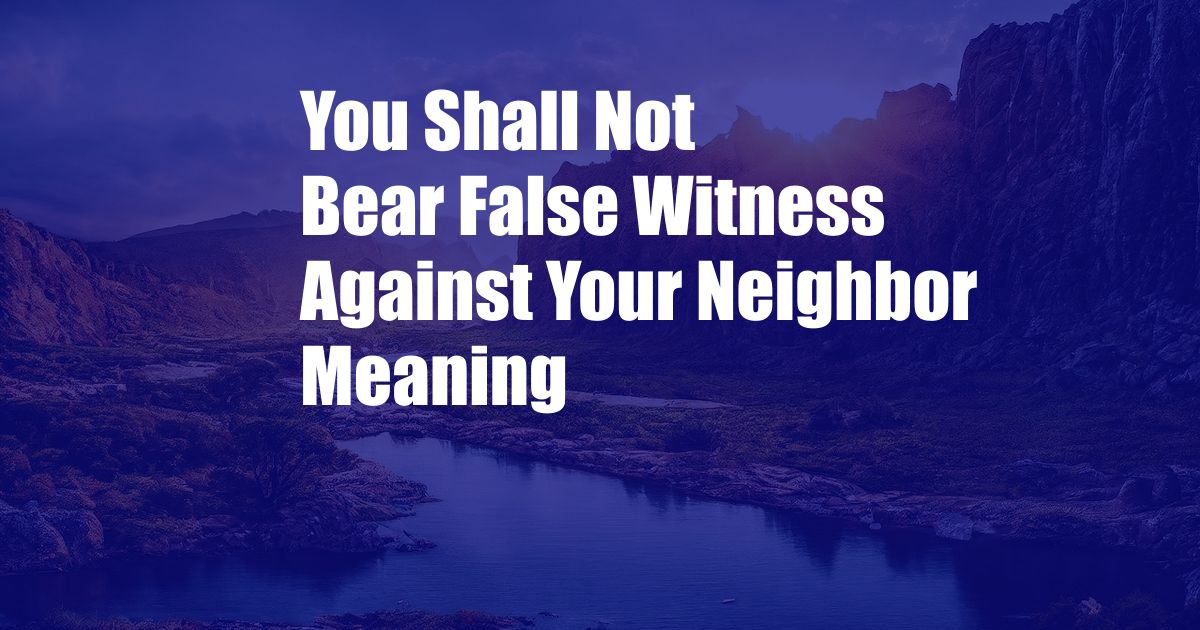
You Shall Not Bear False Witness Against Your Neighbor
In the realm of human conduct, one of the most fundamental principles lies in the biblical commandment, “You shall not bear false witness against your neighbor.” This ethical tenet transcends religious affiliations, guiding us towards a society built on trust and integrity.
Throughout history, the consequences of false witness have been profound. From innocent individuals being wrongly accused to reputations being unjustly tarnished, the ripple effects can be devastating. In the legal realm, perjury is a serious offense, with severe penalties imposed upon those who knowingly provide false testimony.
Defining False Witness
False witness encompasses any act of deliberately lying under oath or providing misleading information. It can occur in various forms, including:
- Perjury: Swearing a false oath or making a false statement in court
- Fabricated Evidence: Creating or altering evidence to support a false claim
- Misrepresentation of Facts: Intentionally omitting or distorting essential information
Consequences of False Witness
The consequences of false witness are far-reaching:
- Legal Punishments: Perjury and other forms of false witness are criminal offenses, carrying potential jail sentences and fines.
- Erosion of Trust: When individuals are falsely accused or have their credibility unjustly attacked, it can undermine social trust and damage relationships.
- Injustice: False witness can result in innocent individuals being convicted or guilty individuals being acquitted, compromising the fairness of the justice system.
Preventing False Witness
Combating false witness requires a multifaceted approach:
- Education: Emphasizing the importance of truthfulness and the consequences of lying from a young age.
- Strengthening Legal Penalties: Enacting stricter penalties for false witness to deter individuals from engaging in such behavior.
- Ethical Reporting: Encouraging individuals to report false witness promptly and to provide truthful information in investigations.
- Promoting Integrity: Fostering a culture of honesty and respecting the ethical principles that guide human conduct.
Expert Advice for Avoiding False Witness
As individuals, we have a responsibility to contribute to a society free from false witness:
- Verify Information: Always verify the accuracy of information before sharing it with others.
- Avoid Gossip: Refrain from spreading rumors or making unsubstantiated claims.
- Speak Up: Report any instances of suspected false witness promptly to the appropriate authorities.
- Be Ethical: Adhere to ethical principles in all interactions, treating others with respect and honesty.
FAQ on False Witness
Q: What does “bearing false witness” mean?
A: It refers to intentionally providing false testimony or misleading information, which can occur in legal or non-legal settings.
Q: What are the potential consequences of false witness?
A: Consequences can range from legal punishments to erosion of trust and the perpetuation of injustices.
Q: How can I prevent false witness?
A: Verify information, avoid gossip, report suspected instances, and promote ethical behavior.
Q: Is false witness a serious offense?
A: Yes, false witness is considered a serious offense in most legal systems, with severe penalties often imposed.
Conclusion
The commandment “You shall not bear false witness against your neighbor” serves as a cornerstone of ethical conduct, promoting trust, integrity, and justice in our society. By understanding the meaning, consequences, and ways to prevent false witness, we can create a world where truthfulness and honesty prevail.
Call to Action:
Are you interested in exploring the topic of false witness further? Share your thoughts or questions in the comments below, and let’s continue the conversation.